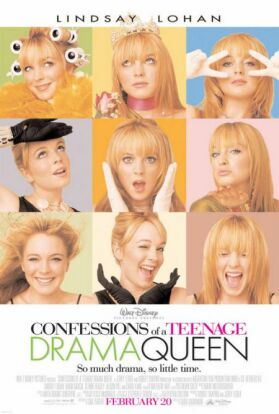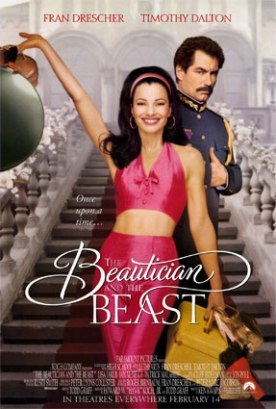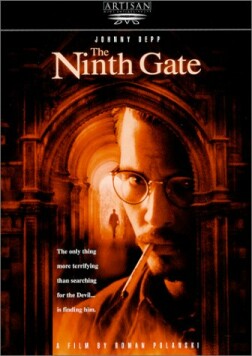Confessions of a Teenage Drama Queen
In Sara Sugarman’s Confessions of a Teenage Drama Queen, the heroine, Lola Stepp (Lindsay Lohan), not only wins universal acclaim as the lead in the school play, not only gets to meet her rock-star idol, a guy called Stu Wolf (Adam Garcia), not only saves Stu from his addiction to alcohol but, finally, she triumphs over her arch-enemy, the stuck-up rich girl Carla (Megan Fox) when Stu himself turns up at a party and in front of everybody hangs her lost bottle-cap necklace around her neck. You’d think that would be enough wish-fulfilment fantasy for any girl, but then, right at the end, Lola tells us that when she subsequently started dating Sam (Eli Marienthal), the sweet but ordinary boy next door, she had realized that “absolute reality could be so much better than fantasy.”
The word “reality,” with or without modifiers, is always a dangerous one for Hollywood to be playing around with. Someone is likely to notice that the context in which it occurs is about as unreal as it is possible to get. In this case, a taste for reality is just a character signpost for Lola. For her to remain sweet and wholesome in our eyes — and sweetness and wholesomeness are basic properties in a movie like this one — she has to end up preferring reality to fantasy, or claiming to do so. But not only does this reality turn out to be pretty darn good — in fact not far off a fantasy in its own right — but she also gets the fantasy on top of it! You’ve got to wonder: how many of the teenage girls to whom a movie like this is meant to appeal will reflect that this is pushing things just a little over the top?
Not very many, probably. Even fewer, I imagine, will be able to detect the original parable against lying and self-dramatization that lies at the bottom of the film’s palimpsest, beneath its many layers of wish-fulfilment, and wonder what happened to it. The title suggests what was meant to be the movie’s original theme. Lola’s real name is Mary, for example. She thinks her life is over when she has to move from New York City to suburban New Jersey. She invents a romantic story to explain why her mother is a single parent. She claims acquaintance with people she has never met and that she has tickets to a concert and invitations to a party when there are no tickets and no invitation.
But instead of moralizing about these little deceptions and dramatizations, the movie makes them out to be the kinds of things that only the hateful Carla would ever bring up against poor Lola. True, her best friend, Ella (Alison Pill), has a bad moment and makes her promise never to lie again, which Lola readily does. But when, to Carla’s mortification, Stu is putting the bottlecap necklace on her in front of everybody, Lola reflects that this is a moment she has pictured in her “wild and crazy dreams” and therefore a proof — if proof were needed — that people ought to have more wild and crazy dreams.
In other words, when the lies become true they are no longer lies.
You can just imagine the script conference that transformed a simple moral about lying into a justification for lying. The kids don’t want any sour moralizing, you see. The movie will be sure to sell a lot more tickets if you tell them that, even if they lie and make things up, it will all be OK in the end. Indeed, it’s much more adventurous and colorful to be a liar. Poor Ella tells Lola that she was miserable before she, Lola, came to town and taught her to misbehave. Why, she had even thought there was no more to life than growing into just such a person as her parents — decent if dull suburbanites — were.
Naturally, the movie stops short of looking into any real (please excuse the expression)-world alternatives to her becoming what her parents are. Perhaps she imagines an adult existence like that of the women in Sex and the City, about which a high school girl recently wrote in USA Today that “Samantha taught me to forget what everyone else thinks, and to only do what you feel is right.” At any rate, Lola has certainly learned the same lesson. Obviously, if teenagers are ever to be deprived of their childish illusions it won’t be by Hollywood.
Advertisement
There are plenty of alcohol addiction treatment centers all over the country that can help anyone burdened by alcohol problems.
Discover more from James Bowman
Subscribe to get the latest posts to your email.




![Inglorious Bastards [QT, note SP]](https://jamesbowman.net/wp-content/uploads/2009/08/ingloriousbastards.jpg)



